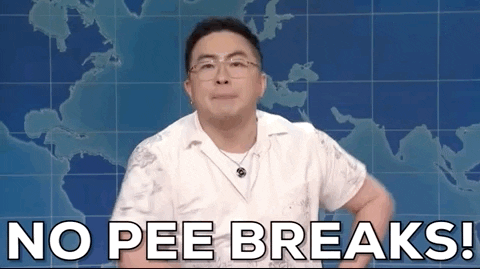- The Daily Tonic
- Posts
- Pee breaks keeping you up?
Pee breaks keeping you up?
Plus: What menopause symptoms say about your health.
DEEP DIVE
Are Bathroom Breaks Keeping You Up At Night?
We’ve all been there. You get to bed early, with plenty of time for a good, restful night of sleep. But then you wake up to use the bathroom, and it isn’t easy to go back to sleep. And then it happens again, and then maybe even a third or fourth time. Next thing you know, it’s time to start the day, and your night was anything but restful.
Struggling with multiple bathroom trips at night is actually a recognized condition known as nocturia, and it is more common than you might think. Nocturia affects millions of Americans, and it’s not just a nuisance; it can significantly disrupt sleep and impact your health. Luckily, there are some steps you can take to manage this condition and enjoy uninterrupted sleep.
Before we get to that, it can be helpful to understand nocturia and why the condition occurs. Nocturia is when you wake up more than once at night to pee, affecting about one in three adults over 30 and half of those over 65 (READ MORE). Various factors can cause nocturia, from drinking too much before bed to certain medical conditions like diabetes or UTIs. And sometimes, it’s just a habit of waking up, even if you don’t really need to go.
So, how can you reduce these annoying night-time pee breaks?
A good place to start is to watch your caffeine intake, especially in the PM hours. Caffeinated beverages can increase your urge to pee due to their diuretic properties. It can also make it harder to get into a deep sleep. The solution? Try to limit your caffeine intake, particularly any time after noon.
Then, there is also pelvic floor therapy. You can strengthen your pelvic floor muscles to give you more bladder control. Kegel exercises are a great start, but you can also seek professional pelvic floor therapy if bladder control is a bigger problem impacting other areas than just your sleep.
Another idea worth trying is compression socks. Wearing compression socks during the day can improve circulation and reduce fluid accumulation in your legs, decreasing the need to urinate at night. Who knew?
This might seem obvious, but it is also helpful to limit evening fluids. Try to minimize your fluid intake in the evening. This includes cutting back on alcohol, which, like caffeine, is a diuretic.
But when should you see a doctor? If these tips don’t help, or if nocturia is severely affecting your life and sleep quality, it’s time to consult a medical professional. They can help identify the cause —be it a health condition or a side effect of medication—and suggest an appropriate treatment plan before the lack of sleep leads to more serious health impacts.
The key takeaway? While nocturia is common and can be bothersome, it’s generally manageable. With the right strategies and, if necessary, medical intervention, you can look forward to better, more restful nights.
TOGETHER WITH MERRY MAKERY
Elevate your work and life with fun templates and savvy tips to live smarter, not harder. Kick off your week with a free Monday morning mood lifter - do less, enjoy more!
|

